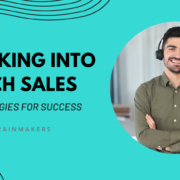Should You Change Jobs?
Here’s a complete list of pros and cons to consider when thinking of making a switch.
Look on any LinkedIn Jobs Posting, and it becomes apparent that it is a buyer’s market in the Tech SDR and AE talent pool. More sales jobs are available than at any other time in our history and with good reason. A top-notch AE can be a rainmaker for a company bringing in millions to the bottom line.
SDRs only have a market life of 18 months, but a skilled Sales Development Rep sets up an AE with solid leads to close, and this is an invaluable skill in our modern business climate. With a new tech company popping up with funding every week and savvy recruiters prowling LinkedIn’s rich waters, chances are if you are a good salesperson, someone will make you an offer too good to refuse. We need to look at the pros and cons of a job offer.
However, does it make sense to change? Change is good, but with any job change, you need to look at the new vs. old job with a critical eye. Try to make a pros and cons list of a job offer outlining everything that needs the critical eye before the jump.

Perceived PRO: Earning Potential = More Money
Perceived CON: Not As Much Income Security
Did you find a better job, or does it just look better?
Where does it fall in the job change decision matrix?
Are the benefits, the work environment, and the income potential all aligned?
Salespeople sell and are sold to. This means we buy easier than the average person.
That sales manager who’s talking to you… he sells for a living, and right now, he is trying to sell you this job.
That new job looks all shiny and awesome. “You can make X,” the Manager says, but WILL you make that?
When asked, “Why do you want to leave your current job?” This is an incredibly tough question because you know what they are thinking. Well, when will he leave us if he leaves the other guys? But, on the other hand, if you answer for the money, is money the only thing keeping you there? A bad job is not worth any amount of money.
Perceived PRO: It’s a Better Company to Sell For.
Perceived CON: You Could Get Better At Your Current Role.
Is the old job terrible, or do you need to improve? Tom was never in the top percentile at his SDR position and sometimes felt his managers didn’t give him the best leads.
He wanted to know more when a new job was dangled his way. His best friend (who got him the old job) cautioned him:
“You need to get better at all the things that make up this job. THEN if you want another job you can go knowing you gave it your all. Plus, you won’t leave with a good recommendation; you have never hit your quota.”
The big takeaway: The grass always looks greener, and perhaps it is green, but leaving before you have the numbers might leave you at a disadvantage.

Perceived PRO: It’s The Job I Want Now.
Perceived CON: It Doesn’t Lead to My Desired Job in 5-years.
Which job will let you grow to your highest potential?
Where do you want to be in 4 years?
An SDR’s life is not easy; it’s daily grunt work! Lots of emails. You’re texting, cold calling, sending white papers, and doing social media work. But, in the long run, it has a logical payout- the coveted Account Executive position. So here is the question: is your SDR Position getting you there? Are you heading toward becoming an AE?
These are things to consider before changing jobs. What is your current agreement with your Sales Manager about getting you to the AE position? Do you believe her? Letting your current Manager know how hungry you are for the AE position might change the dynamics of your current position. Your Manager could fast-track you; quitting would cut off that path.
Perceived PRO: It’s a Hungry Startup With Lots of Potential.
Perceived CON: Last Hired Is Often First Fired.
When Martin came into his new AE position, everything looked great. Then, the last quarter’s numbers came in lower than expected, and the funding dried up. His position was the first to go. “I wish I had spent more time looking at the bottom line details. They were struggling, but all I saw was the money.”
Startups can be heavy with egos struggling to survive. Is it the environment? Is the sales floor an uncomfortable, competitive, and toxic environment? How do you explain this? Try outlining the environment you work best in. Do you thrive in silence, or does the loudness drive you to new heights? I’ve worked with many salespeople who actually struggled in quiet environments. Personally, I love them. Making a move to find a place where you can work better is a narrative that works.

Perceived PRO: A New Product, A New Sales Process
Perceived CON: You Are Now The New
How long will it take to get you up to superstar speed? First, spend time on the floor or mirroring a top performer. Ask them, “How long until I can do what you do?” Then double it, just to give yourself breathing room. Is that a comfortable amount of time? Pros: You get to learn a new product, a new system. It’s a basket full of new. I thrive on this; I’m a quick learner. I’ve worked with several reps who take a long time to ramp up, which can cause stress in a new work environment. Some people need change; new ideas energize them. When I study the number of reps who give up, I see a trend of not seeing the act achieved in the daily grind. Did you give up too early to even make a good decision?
Perceived PRO: Feels Good To Be Wanted.
Perceived CON: Ignore Your Ego. Why Do They Want You?
What is the real reason you want to leave? Is it an incredible ego rush to hear from a recruiter saying all the right things? “We have heard great things about you!” Being wanted by another company feels good. However, this new car smell wears off quickly if the numbers aren’t delivered. Then what happens? Are you prepared for the worst as well as the best? Asking the company why they think you would be a good fit for them. This can be very illuminating. Explain how you work best, and ask to examine the environment you will sell in before determining if it will work for you.
We are blessed and cursed in the sales profession to have such a rich and vibrant market to earn our living. However, with success comes the inevitable call or text from the recruiter. Whether we decide to take the job offer or to stay depends on many factors, and a critical eye to decide which is which.
If you have decided it’s time to find a new sales job, create a profile on Rainmakers and start browsing companies that are now actively hiring!




















